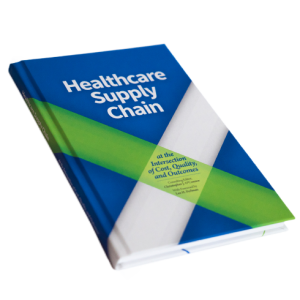Update: The second edition of our CQO Book has been released. Please see our post “New Book Positions a Clinically Integrated Supply Chain as Critical to Improving Patient Outcomes” for more information.
 Hospital supply chain executives and leadership teams have a new resource guide to help them develop a clinically integrated value chain that supports a population health management strategy with the release of Healthcare Supply Chain at the Intersection of Cost, Quality, and Outcomes by Nexera, Inc. The book complements the Hospital Supply Chain Performance Self-Assessment™, a free tool created by Nexera consultants that helps benchmark and improve healthcare supply chain performance. Complimentary copies of the book are now available for order on the Nexera website at www.nexerainc.com/cqo/.
Hospital supply chain executives and leadership teams have a new resource guide to help them develop a clinically integrated value chain that supports a population health management strategy with the release of Healthcare Supply Chain at the Intersection of Cost, Quality, and Outcomes by Nexera, Inc. The book complements the Hospital Supply Chain Performance Self-Assessment™, a free tool created by Nexera consultants that helps benchmark and improve healthcare supply chain performance. Complimentary copies of the book are now available for order on the Nexera website at www.nexerainc.com/cqo/.
“In the past decade, healthcare has evolved from volume-based to value-based reimbursement. Supply chain, which can account for as much as 50% of a healthcare institution’s total spend, needs to follow reimbursement models and link its goals and performance to care quality and patient outcomes,” said Christopher J. O’Connor, Nexera President and Consulting Editor of the book.
Healthcare Supply Chain at the Intersection of Cost, Quality, and Outcomes provides a framework for how hospitals can succeed in the new healthcare economy by optimizing performance and reimbursements at the intersection of cost, quality, and outcomes (CQO), in which
- cost equals all costs associated with delivering patient care and supporting the care environment;
- the quality of patient care is aimed at achieving the best possible clinical outcomes; and
- outcomes in the form of financial reimbursements are driven by outstanding care at the appropriate cost.
“Under a CQO approach, supply chain management is elevated to an even more strategic level,” noted O’Connor. “The book illustrates how, by implementing various technologies, supply chain professionals can track patient outcome metrics, weighing results against various clinical inputs and monitoring effects of cost-avoidance through clinical measures. With these data, the supply chain can become a valuable partner in reviewing clinical protocols, product selection, and inventory management processes, identifying where hospitals can improve care and lower costs.”
Using CQO as a guiding principle, the book breaks down the healthcare supply chain into 12 focus areas, creating a structure that can measure current supply chain operations and offering strategic direction for improving performance. Health systems can use the book to develop a value-driven supply chain, which is essential to value-based care.
About Nexera, Inc.:
Nexera delivers solutions tailored to improve hospital and health-system performance. Using a value-driven approach that ties total costs and patient outcomes with financial reimbursements, Nexera designs engagements around each client’s resources and business culture, ensuring that services generate sustainable results and foster system transformation. Learn more about how Nexera is using the CQO framework to help hospitals and health systems adopt a more strategic approach to supply chain management at www.nexerainc.com.
Contacts
Alexandra Schonholz
T (212) 554-7230
E aschonholz@nexerainc.com



Comments are closed.